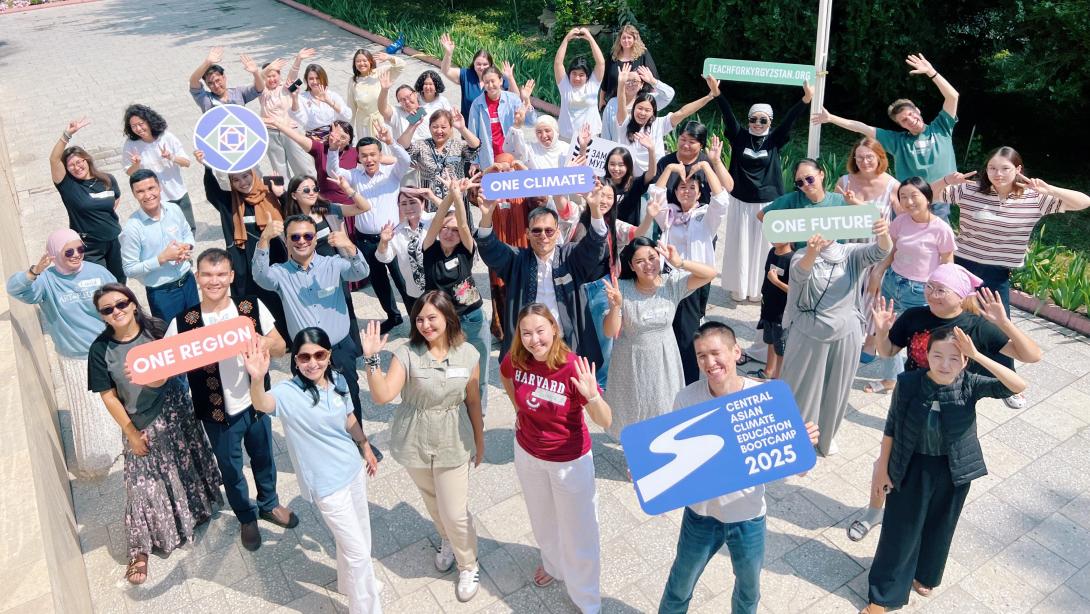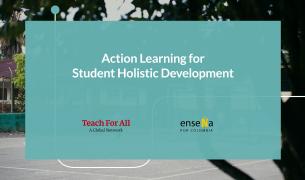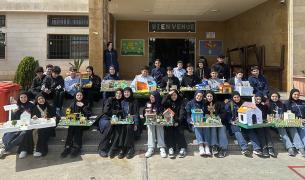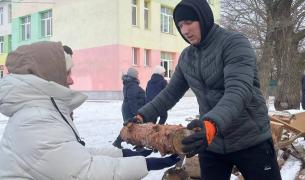Climate Education Bootcamp: Collaborating for climate action in Central Asia

From August 13–17, educators from Teach For Qazaqstan, Teach For Uzbekistan, and Teach For Kyrgyzstan came together at Issyk-Kul Lake for the first-ever Central Asia Climate Education Bootcamp. The idea for the Bootcamp came from a shared understanding that countries across Central Asia face similar climate challenges, and that teachers need more tools and support to discuss these issues with their students. So the goal was to strengthen climate leadership and regional cooperation. Teach For Kyrgyzstan led the coordination, hosting and providing major part of sessions, while Teach For Uzbekistan and Teach For Qazaqstan contributed by bringing expert speakers, translating key resources, and co-designing learning sessions.
Central Asia is one of the regions most vulnerable to the effects of climate change. The region is already facing its effects: shrinking glaciers, water shortages, desertification, floods, air pollution. These issues go beyond the environment—they impact health, economies, and even regional stability. The Head of the Teach For Kyrgyzstan Board, Daniyar Amanaliev, one of the guests at the Bootcamp, compared climate change to the ‘approach of the White Walkers’ from "Game of Thrones." The image was strikingly accurate: we all know they are coming, we can feel their cold breath, yet we continue to live as if nothing is happening. This is why education matters, to raise awareness and action. Unfortunately, climate education is still limited in schools. Today’s learners are tomorrow’s decision makers, and it is crucial to help them to learn more about the climate crisis. The Bootcamp was created to start this change.
What did the participants experience?
Over five days, fellows finishing their first year and a few teachers from partner schools expanded their understanding of climate topics and elaborated on how to bring climate education into classrooms in accessible and inspiring ways. The sessions were in person, so that participants had an opportunity to make new connections, share challenges and look for solutions together. They also shared their country contexts, built lesson ideas, brainstormed and planned climate projects, and connected deeply across borders.
For many participants, the Bootcamp was not only about learning but about realizing their own power to act. Khaknazar, a fellow from Teach For Qazaqstan, reflected: “If humanity wants to survive, we must unite! There is no such thing as someone else’s nature or someone else’s country—there is only one shared planet. The Bootcamp made me realize how serious the problem is and how big a role I can play in teaching eco-conscious children.”
Aydenek from Teach For Kyrgyzstan highlighted how interactive activities reshaped her perspective: “The ‘World Fishing’ game left a strong impression. It showed how hard it is for countries to agree—everyone thinks about their own benefit, and in the end the resources are exhausted. It was painful to realize how often humanity consumes rather than creates. If we treat nature thoughtlessly, we become more like parasites on this planet than its part.”
Looking ahead
The Bootcamp was a first step. Next, each organization will adapt what was learned into classroom resources, projects, and keep teachers connected through a regional network. Teachers will now pass the knowledge they got to their classrooms.
It is worth mentioning that sessions have already sparked concrete action plans. Zuxriddin, a fellow from Teach For Uzbekistan, shared: “The Bootcamp was a powerful experience. Learning about local impacts like glacier melt made the issue urgent, but also solvable. I left with practical teaching tools and a sense of hopeful purpose. I plan to start an eco-club and integrate climate topics across subjects at my school.”
During the year participants will work on integrating questions of climate change in their lessons, increase awareness among their students and communities they work with, and later in spring, we will gather again in Uzbekistan to share what we’ve achieved. This will be a great opportunity to learn from each other, support each other, reflect, and plan further collaborations.
As Mohirbanu, from Teach For Uzbekistan, mentioned: “It was truly transformative and life-changing. I felt at home, safe, and deeply connected with everyone. What stood out most was the sense of shared values with fellows from Kazakhstan and Kyrgyzstan.”
Her words capture the essence of why this partnership matters. Climate change is a shared challenge, and we have an opportunity to build shared solutions. Gatherings like the Bootcamp remind us that collaboration is not only possible, but also powerful.
As a part of the Teach For All network, I believe that when educators come together across borders, they can spark change far greater than any one classroom or country. We all have something in common, and we all have a role to play. Let’s continue to connect, collaborate, and create the future that our regions and our planet deserve.


